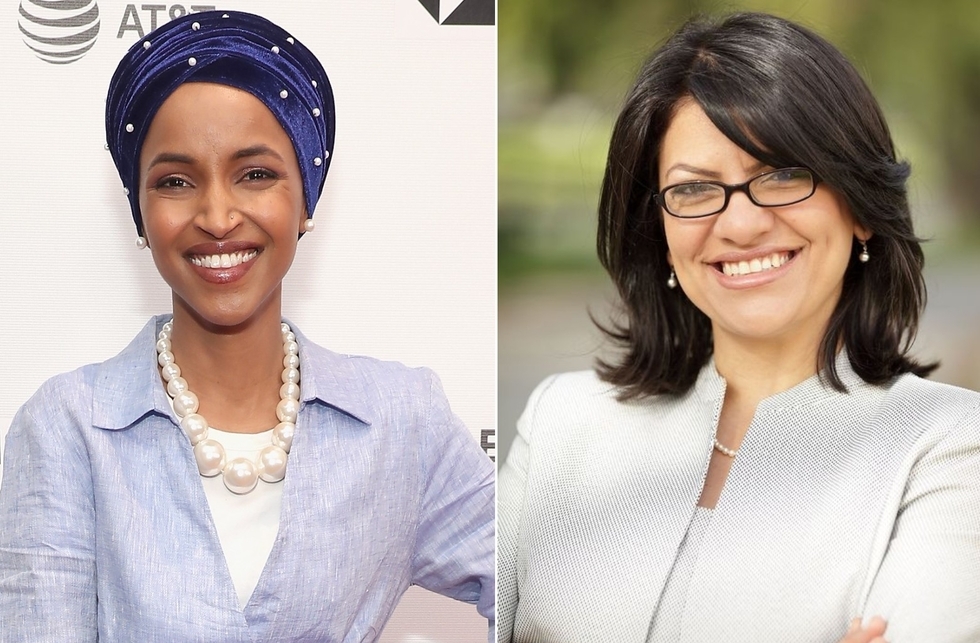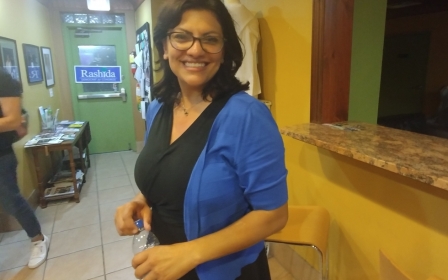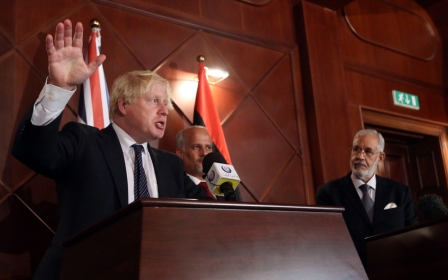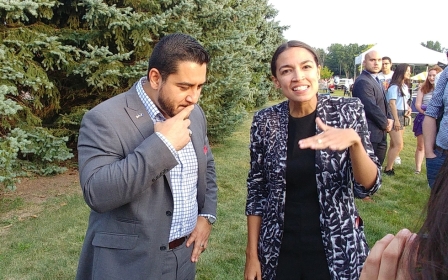Two Muslim women in Congress: What can they achieve in Washington?

DETROIT, United States - Arab and Muslim communities across the US are elated by the primary victories of Rashida Tlaib and Ilhan Omar, who in January will almost certainly enter the US Capitol as the first Muslim women in Congress.
Tlaib of Michigan and Omar of Minnesota are running in safe Democratic districts in November, but are likely to encounter some degree of hostility towards immigrants and Muslims when they get to Washington, where President Donald Trump has amped up his nationalistic America First policies.
Both women have embraced the progressive left-wing base of the Democratic Party. Tlaib, who is the daughter of Palestinian immigrants, will find herself in a Congress that mostly supports Israel and is reluctant to criticise it.
But beyond identity and rhetoric, what potential impact might Tlaib and Omar have in Washington?
Two lawmakers in the 435-member chamber are unlikely to have a divisive influence on US politics, but they can amplify underrepresented viewpoints. Their presence in the US Capitol is a statement on its own, experts say.
Sally Howell, an Arab-American studies professor at the University of Michigan-Dearborn, said that given Congress's general ineffectiveness, the two future congresswomen should not be expected to alter national policies.
Howell noted that Tlaib ran a campaign based on constituent services for residents of her district, the majority of whom are not Arab or Muslim.
Tlaib's vision of her role in Congress is one of fighting for the needs of the people she represents in Detroit, although her political mission and identity have been significantly shaped by her Palestinian Muslim background, Howell said.
On Palestine
In spite of her local focus on economic and environmental issues, Tlaib has spoken out repeatedly on Palestine.
On Friday, liberal Jewish group J Street withdrew its endorsement of Tlaib after she voiced support for one state with equal rights for both Jews and Palestinians, moving away from the standard US Middle East position that advocates a two-state solution, which critics say is no longer viable.
"It has to be one state. Separate but equal does not work. I’m only 42 years old, but my teachers were of that generation that marched with Martin Luther King. This whole idea of a two-state solution, it doesn’t work," Tlaib told In These Times magazine in an interview earlier this month.
Omar's campaign platform stresses justice as a precursor to peace in the Middle East, and calls for ending the blockade on Gaza as well as the occupation of the West Bank and East Jerusalem.
Howell said Tlaib may speak out and dissent on US foreign policy issues, including on Palestine, but that does not mean that she will bring about change, other than by articulating a Palestinian perspective in Washington.
Still, the two women’s victories are symbolically important, Howell said.
"We're in a political period where immigrants in general and Muslims in particular are being denigrated by the president, by the president's administration and to a certain extent by the president's political party," Howell said.
"To have two women elected to Congress, one is an immigrant herself and the other the daughter of immigrants, both of whom are Muslim, this really pushes back against the narrative that Arabs, Muslims and immigrants are a threat to us rather than a part of us."
Omar came to the United States as a refugee from Somalia.
Tlaib and Omar, Howell added, are visible proof that immigrants are part of the fabric of America.
"On the question of immigration policy, I think that they will have a very strong voice there because they're not political outsiders on those issues; they're in the absolute mainstream of the Democratic Party when it comes to issues like immigration. They will be able to make a difference on that."
'A shift'
George Bisharat, a Palestinian-American professor at the UC Hastings College of Law in San Francisco, highlighted the "image disrupting" nature of Omar and Tlaib's election victories.
"What I think is really amazing, both of these women, they are Muslim and they are progressive," Bisharat told MEE.
He added: "It's going to cause people to think twice about some of the stereotypes that are being propagated about women in the Middle East, Muslim women in particular."
Bisharat said their election may represent an "opening" for a new discourse on issues related to the Middle East.
Bisharat said while Tlaib may not be able to affect US foreign policy in the near term, her victory - in spite of her Palestinian identity and criticism of Israel - reveals a "shift" on Palestine within the Democratic base.
A poll by the Pew Research Center released early in 2018 showed that only 27 percent of Democrats sympathise more with Israel than Palestinians, compared with 79 percent of Republicans.
Progressive Democrats, including Tlaib and Omar, are especially more likely to criticise Israel.
However, changes of tone on Israel in Democratic circles will not be translated into new US foreign policy towards Palestine in the near future.
"We need more progressive candidates in the Democratic Party for Congress," Bisharat said.
"Demographic indicators suggest that's likely. There are reasons for optimism, but you can be disillusioned if you expect change to be quick."
New MEE newsletter: Jerusalem Dispatch
Sign up to get the latest insights and analysis on Israel-Palestine, alongside Turkey Unpacked and other MEE newsletters
Middle East Eye delivers independent and unrivalled coverage and analysis of the Middle East, North Africa and beyond. To learn more about republishing this content and the associated fees, please fill out this form. More about MEE can be found here.




